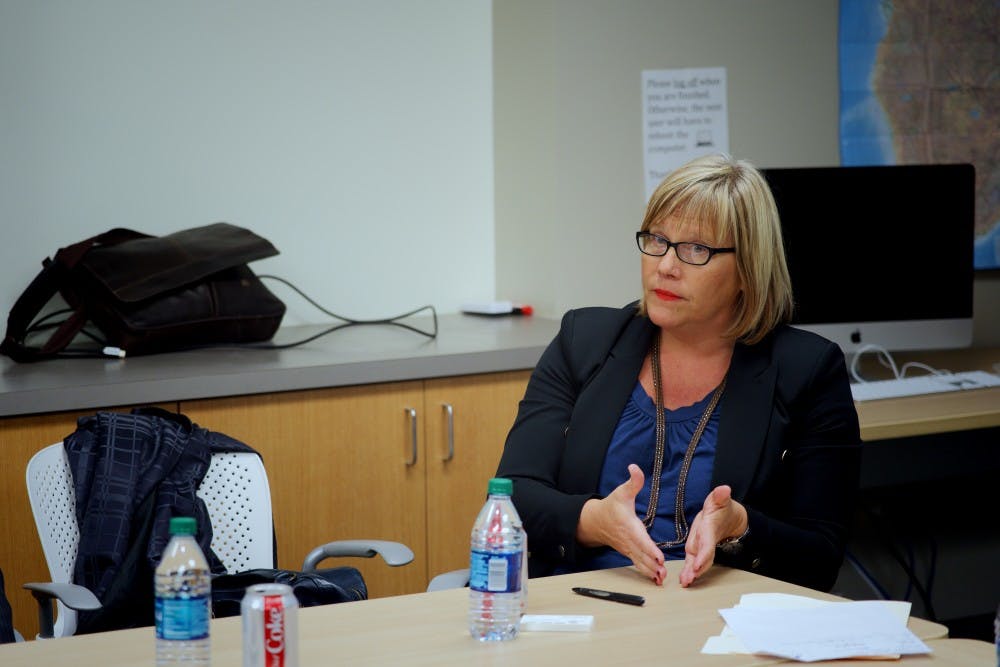The American Studies Department hosted an event Monday evening as part of its “Pizza & Praxis” series, with professors, guests and American Studies majors discussing how reproductive rights could change with the confirmation of Justice Brett Kavanaugh to the U.S. Supreme Court.
Pizza & Praxis, which takes place a few times a semester, offers American Studies students slices of pizza along with discussion of relevant issues facing the country. Around 30 people were in attendance Monday evening.
This installment of the series — “Abortion Access and Reproductive Justice After Kavanaugh” — comes in light of Kavanaugh’s appointment to the Supreme Court and allegations of sexual assault brought forward by Dr. Christine Blasey Ford, a professor at Palo Alto University. As a more conservative justice, Kavanaugh has the power to supply a final vote to overturn decisions such as Roe v. Wade, a 1973 case guaranteeing women in America the right to an abortion.
U.S. President Donald Trump nominated Kavanaugh to become an associate justice of the Supreme Court in July, after then-Justice Anthony Kennedy announced his retirement in June. Kennedy was typically considered a moderate and served as a swing vote in some of the Court’s most ideologically-charged decisions.
Kavanaugh served on the United States Court of Appeals for the D.C. Circuit for over 12 years, with a consistently conservative record and favorable reputation. But critics have noted that he is far more conservative than Kennedy, which could upset the current ideological balance of the Supreme Court.
Many believed Kavanaugh’s nomination was practically a guarantee. However, his status was threatened when the allegations of sexual assault and misconduct were brought forth by Ford and other women.
After a lengthy and contentious confirmation process, the Senate voted to confirm Kavanaugh into the Supreme Court earlier this month. The decision sparked controversy, as many who were opposed to Kavanaugh did not believe a person accused of sexual assault should have the ability to overturn decisions such as Roe v. Wade.
The Pizza and Praxis series aims to bring together American Studies majors in an informal setting to discuss a variety of topics. Monday’s installment was an opportunity for students and professors to listen and discuss their opinions on Kavanaugh and the future of reproductive rights freely.
“Pizza and Praxis is just an ongoing event that the American Studies department puts on for its majors a few times per semester,” Asst. American Studies Prof. Jack Hamilton told The Cavalier Daily. “It is more to get them to talk about American Studies in a more informal, colloquial [way.]”
The event raised questions about the current state of abortion access and how laws would change if Roe v. Wade is overturned by the Supreme Court.
The event also featured guest speakers — American Studies postdoctoral fellow Gillian Frank and local non-profit founder Amy Hagstrom Miller.
Frank recently joined the American Studies department at the University. He holds a doctoral degree in American Studies from Brown University, where he concentrated on the role of women, gender and sexuality in the 20th-century U.S. He has since published several books and projects on topics such as sexuality, gender and religion in the U.S.
“Abortion is in the news and the future of abortion access appears to be hanging in the balance,” Frank said in an interview. “It is important for students to hear from the providers on the front lines the debate on abortion to understand current state of abortion politics.”
Hagstrom is the founder and CEO of Whole Woman’s Health, a local non-profit that provides holistic abortion care facilities. According to the Whole Woman’s Health website, their mission is, “to [destigmatize] abortion and [create] safe spaces for all people, whether it’s within [their] clinics or in the communities where they live.”
The structure of the event allowed for a short discussion between Frank and Hagstrom about their roles in studying and working in the field of abortion before being opened up to student questions. The conversation centered around topics such as the future of access to abortion and what access to abortion looks like in Charlottesville.
“If the past is any predictor, the strategy is whittle away at abortion access, to create burdensome laws that prevent women from easily and succinctly accessing abortions and to make it more costly as to prevent people from having abortions,” Frank said in the interview. “The probability is that there will be an erosion of access before there is an overturn [of Roe v. Wade].”
Other topics of conversation centered around how individual state governments restrict abortions under Roe v. Wade and Hagstrom’s work as a plaintiff in various legal battles to combat anti-abortion legislation that has no medical purpose.
Hagstrom also of spoke the importance of access to abortions in relation to bolstering women and creating a more equal society.
“I think that abortion is sort of a rallying cry for the religious right,” Hagstrom said in an interview. “I think abortion represents women’s equality and access to control their reproduction and therefore operate equally in the workforce and society. I think that is a threat to the people in power.”
Hagstrom urged the students to take action by voting and by sharing the stories of everyday people who have had abortions in order to destigmatize the topic.
“There is a group of people representing us that don’t represent the majority of the population and I think we have to engage in making that different,” Hagstrom said. “I think it is important for people to speak out and to not perpetuate the stigmas around abortion that exist.”
Corrections: This article previously misattributed quotes from local non-profit founder Amy Hagstrom Miller to American Studies postdoctoral fellow Gillian Frank.







